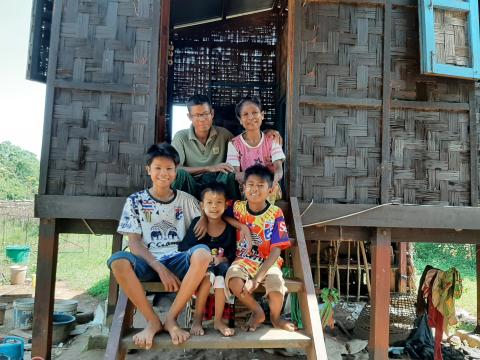Towards a brighter future

Since early 2021, the socioeconomic and civil unrest has become more complicated and shows no indications of improvement, putting Myanmar people, particularly its vulnerable families, at risk of food insecurity.
Htet's family was one of the families that had been experiencing food insecurity.
"We used to reside in a house with a thatch roof and walls, partly covered by a damaged plastic shelter. The place was unsafe and insecure for us. The hardest part was that it was difficult for our family to eat three meals a day,” Htet recalls.
Htet, a thirteen-year-old boy studying in Grade Five, is a registered child of World Vision Myanmar's development programme. He lives in a small village near Mawlamyine City with his parents and four siblings. Despite his two elder sisters dropping out of school and finding employment, they are unable to provide financial support to their parents. His older brother is in grade six and fifteen years old. Htet and his brother had to stop attending school due to the increasing external instability.
"My parents are not educated and their farming methods for planting gourds and ridge gourds in the past were too traditional," claims Htet.
Due to a lack of modern farming methods and fertilizer, his family's vegetable garden didn't produce well. The veggies weren't of very high quality and were priced below market. As a result, the income from selling veggies was meagre, and it barely cover his family's daily food expenses. His family was enmeshed in debt. Due to their daily struggles to have food, his parents were unable to support their kids' education and well-being.
Fortunately, before the pandemic in 2019, Htet's family was chosen to join the Ultra Poor Graduation (UPG) programme of World Vision Myanmar (WVM).
From the UPG programme, Htet’s family received a food ration for six months, including rice, beans, cooking oil, dried fish, and seeds for home gardening. Due to the food ration, his parents no longer have to worry about buying food and can instead save their money and invest it in growing the family business.
Along with receiving emergency aid, his family was offered the opportunity to participate in parental education programs for parents and caregivers on topics like nutrition, child protection, and health. His parents also received training in home gardening, so they knew how to cook nutritious meals for the kids using organic vegetables from their garden and share any leftovers with their neighbours.
Additionally, his parents were provided with vocational training in livestock breeding and systematic vegetable planting. Now, his family has planted mushrooms successfully and can raise chickens and cows for food and sales on a small scale in the backyard thanks to the knowledge they have gained via training.
Htet’s mother also became a member of the Savings for Transformation (S4T) group, initiated by WVM. His mother and other neighbours joined the S4T awareness training provided by community-based organizations’ members and WVM staff. As a result, they have gained a better understanding of personal finance and recognize the importance of savings. They had no intention of saving their extra cash in the past. They now have a good habit of saving money, which they put to good use for their business, their children's education, and their health. And, they can access low-interest loans from the S4T savings group.
"After producing mushrooms for two seasons, we sold them for 1.3 million Kyats (about USD 500). We purchased a cow and a few chickens with the money from the mushroom farm, savings, and a cheaper loan from the savings club," Htet’s mother says.
She also proudly shares, "We now have three cows and chicken farms”.
In addition to the food ration and life skills training, WVM provided his family with housing materials to rebuild their house. At present, he can live in a home with a zinc roof and bamboo walls.
“We now dwell in a safe and secure home. We didn't go to school this year, but WVM provided us with storybooks and sketching books. So that we can do self-study in our home,” Htet says.
He adds, "My younger brother and I will attend school next year.”
The financial and social resilience of Htet’s family has been steadily increasing even throughout the crisis. In the end, his family graduated from the UPG programme in the fiscal year 2021. his family became a part of the Building Secured Livelihoods (BSL) programme, which helps them in enhancing their sources of income.
“My parents are able to generate a reliable source of income from home gardening and raising livestock. In addition to allowing us to preserve the extra money in the S4T group, my mother can make healthy meals for us every day. We have now regular family dinner time. Also, my parents can focus on our education and health needs,” Htet shares.
He continues and smiles, “I vowed to do my best to be a decent and competent son for my parents.”
The Mawlamyine Resilience and Livelihoods Programme has been carrying out technical projects since October 2018, including Building Secured Livelihoods, Savings for Transformation, and Ultra Poor Graduation. Throughout the S4T project, 32 savings groups with 567 members have impacted 2755 people. Additionally, 43 households under the UPG project have impacted 209 people, and 64 families under the BSL project have impacted 311 people. As of 2022, the project has positively benefited a total of 6400 people, including almost 3,900 children, by enhancing their financial resilience, family businesses, and saving habits. This will raise their standard of living and prevent them from experiencing food insecurity.